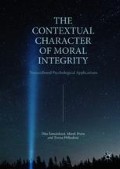Abstract
The chapter opens the topic of moral integrity, defining it linguistically and pointing out that in Czech, the term does not actually have a natural equivalent. It describes the Anglo-Saxon moral integrity concepts in philosophy, law, and psychology, with special attention paid to Erik H. Erikson’s transcultural investigations of early development, as well as his concept of Ego Integrity as an objective of the successfully completed life cycle. Mutual interconnectedness of bio-psycho-social aspects of moral integrity evolving within the person’s personality is emphasised in contrast to concepts stressing mere adherence to abstract moral principles.
Access this chapter
Tax calculation will be finalised at checkout
Purchases are for personal use only
References
Barnard, A., Schurink, W., & De Beer, M. (2008). A Conceptual Framework of Integrity. Empirical Research, 34(2), 40–49.
Beebe, J. (1992). Integrity in Depth. College Station: Texas A&M University Press.
Carter, S. L. (1996). Integrity. New York: Basic Books.
Collins English Dictionary—Complete and Unabridged (12th ed.). (2014). Glasgow: HarperCollins.
Connelly, B. S., Lilienfeld, S. O., & Schmeelk, K. M. (2006). Integrity Tests and Morality: Associations with Ego Development, Moral Reasoning, and Psychopathic Personality. International Journal of Selection and Assessment, 14(1), 82–86.
Dworkin, R. (1987). Law’s Empire. Harvard: Harvard University Press.
Erikson, E. H. (1993). Childhood and Society. London and New York: W. W. Norton. First Published in 1950.
Erikson, E. H. (1998). The Life Cycle Completed. London and New York: W. W. Norton. First Published in 1982.
Geddes & Grosset English Dictionary & Thesaurus (2nd ed.). (2008). New Lanark, Scotland: Index Books.
Hooijberg, R., Lane, N., & Diversé, A. (2010). Leader Effectiveness and Integrity: Wishful Thinking? International Journal of Organizational Analysis, 18(1), 59–75.
Peterson, C., & Seligman, M. E. P. (2004). Character Strengths and Virtues: A Classification and Handbook. New York: Oxford University Press.
Author information
Authors and Affiliations
Corresponding author
Rights and permissions
Copyright information
© 2018 The Author(s)
About this chapter
Cite this chapter
Šamánková, D., Preiss, M., Příhodová, T. (2018). General Integrity Concepts. In: The Contextual Character of Moral Integrity. Palgrave Macmillan, Cham. https://doi.org/10.1007/978-3-319-89536-9_6
Download citation
DOI: https://doi.org/10.1007/978-3-319-89536-9_6
Published:
Publisher Name: Palgrave Macmillan, Cham
Print ISBN: 978-3-319-89535-2
Online ISBN: 978-3-319-89536-9
eBook Packages: Behavioral Science and PsychologyBehavioral Science and Psychology (R0)

